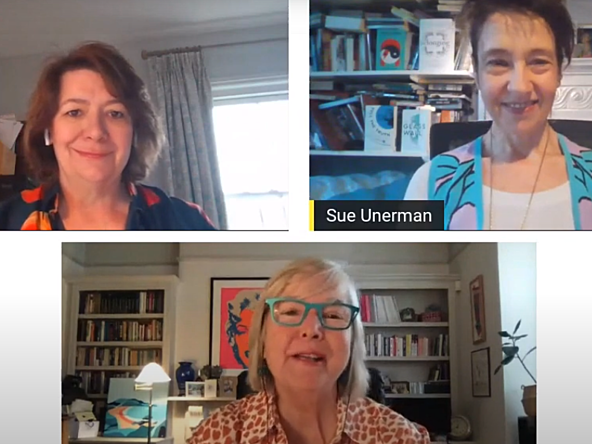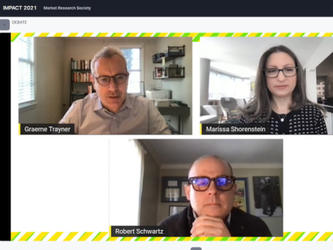Belonging authors on reimagining the workplace

At the end of the day two of the conference, MRS president Jan Gooding (pictured, bottom) interviewed Sue Unerman, chief transformation officer at MediaCom (pictured, right) and Kathryn Jacob, chief executive of Pearl & Dean (pictured, left), co-authors of Belonging along with Mark Edwards.
The second book from Unerman and Jacob focuses on how men can become allies in order to foster more inclusion in the workplace.
It stemmed from a sense of frustration from the two over companies’ “disappointing” progress with gender and racial diversity at senior levels, said Unerman.
“Over $8bn is spent on diversity and inclusion efforts a year – it’s something a lot of people talk about but the outcomes are disappointingly slow.”
When Unerman and Jacob held promotional events for their first book, The Glass Wall, an audience member would always invariably ask: ‘Where are the men? Why aren’t they here?’
Unerman said: “We believe that the diversity and inclusion industry has this problem where it has managed to exclude from the conversation, and from action, the very men who are still largely holding those seats of power – very often white-middle aged men.”
She added that the reason she had stayed at media agency MediaCom for so long had been the “sense of belonging” and a sense that she can “contribute to the culture”.
When Gooding asked why the case for greater diversity is still being made, Jacob said there is still a belief from some business leaders that “it is happening somewhere else” or that it is “someone else’s job”.
She also cited the issue of people feeling that they can’t speak up about the issue because they themselves are not part of a protected characteristic. One company, noted Jacob, made its employees compete for diversity and inclusion budget “like the Hunger Games”.
Jacob said: “To some people it feels like an intractable issue – they don’t know how to help and they wonder ‘what if I make it worse by doing the wrong thing?’”
Companies have begun to pay more attention to the lack of diversity since the Black Lives Matter movement coming to the fore last summer, but it is not a new problem. Unerman said: “The issue is about breaking the current mould of business that stems from the 19th century – work was designed by white, patriarchal men with stay-at-home partners.”
“It’s about asking ‘how do we get rid of these ways of operating that don’t fit many different kinds of people?’,” she added, and said: “It is totally our job as leaders to make sure we reimagine leadership in our industry.”
It is possible for companies to measure ‘belonging’ but they must first have a measure of diversity, said Unerman, as: “A rugby playing person joining a group of rugby players will feel that they belong.”
Research for the book conducted by Dynata in the UK and US found that one in three respondents in the UK ‘don’t feel that they belong in their organisation’, Unerman said. One in three also reported experiencing inequality at work.
The notion of ‘culture fit’ in the advertising and communications industry can contribute to people feeling that they can’t be themselves at work or fit themselves into a particular mould, according to Jacob.
She talked about the ‘glass slipper syndrome’, where “you’ve got to chop your toes off to fit in, and as long as nobody notices, that’s fine”.
Jacob added that companies should say to new starts: “We don’t want you to be a culture fit, we want you to be a culture expander.”
Gooding also raised the issue of extroverted people often being most likely to contribute in meetings or to the broader inclusion conversation, and Unerman said: “The joiners-in are not the problem – it’s those people who don’t join in, who may have masses to contribute in terms of different thinking. You need misfits to create new answers to things.”
If you missed the conference, it’s all available via the MRS on demand service. Go to www.mrs.org.uk/Impact2021 to find out more.

We hope you enjoyed this article.
Research Live is published by MRS.
The Market Research Society (MRS) exists to promote and protect the research sector, showcasing how research delivers impact for businesses and government.
Members of MRS enjoy many benefits including tailoured policy guidance, discounts on training and conferences, and access to member-only content.
For example, there's an archive of winning case studies from over a decade of MRS Awards.
Find out more about the benefits of joining MRS here.




_crop[crop:592x444+0+0;h:250;q:75;id:2446262].jpg)









0 Comments